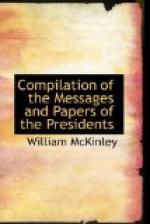An envoy from Siam has been accredited to this Government and has presented his credentials.
Immediately upon the outbreak of the war with Spain the Swiss Government, fulfilling the high mission it has deservedly assumed as the patron of the International Red Cross, proposed to the United States and Spain that they should severally recognize and carry into execution, as a modus vivendi, during the continuance of hostilities, the additional articles proposed by the international conference of Geneva, October 20, 1868, extending the effects of the existing Red Cross convention of 1864 to the conduct of naval war. Following the example set by France and Germany in 1870 in adopting such a modus vivendi, and in view of the accession of the United States to those additional articles in 1882, although the exchange of ratifications thereof still remained uneffected, the Swiss proposal was promptly and cordially accepted by us, and simultaneously by Spain.
This Government feels a keen satisfaction in having thus been enabled to testify its adherence to the broadest principles of humanity even amidst the clash of war, and it is to be hoped that the extension of the Red Cross compact to hostilities by sea as well as on land may soon become an accomplished fact through the general promulgation of the additional naval Red Cross articles by the maritime powers now parties to the convention of 1864.
The important question of the claim of Switzerland to the perpetual cantonal allegiance of American citizens of Swiss origin has not made hopeful progress toward a solution, and controversies in this regard still continue.
The newly accredited envoy of the United States to the Ottoman Porte carries instructions looking to the disposal of matters in controversy with Turkey for a number of years. He is especially charged to press for a just settlement of our claims for indemnity by reason of the destruction of the property of American missionaries resident in that country during the Armenian troubles of 1895, as well as for the recognition of older claims of equal justness.
He is also instructed to seek an adjustment of the dispute growing out of the refusal of Turkey to recognize the acquired citizenship of Ottoman-born persons naturalized in the United States since 1869 without prior imperial consent, and in the same general relation he is directed to endeavor to bring about a solution of the question which has more or less acutely existed since 1869 concerning the jurisdictional rights of the United States in matters of criminal procedure and punishment under Article IV of the treaty of 1830. This latter difficulty grows out of a verbal difference, claimed by Turkey to be essential, between the original Turkish text and the promulgated translation.
After more than two years from the appointment of a consul of this country to Erzerum, he has received his exequatur.




